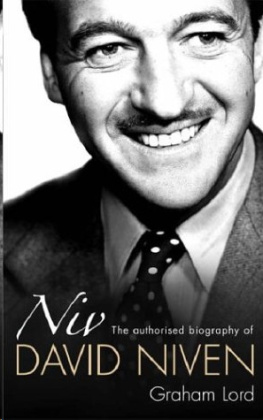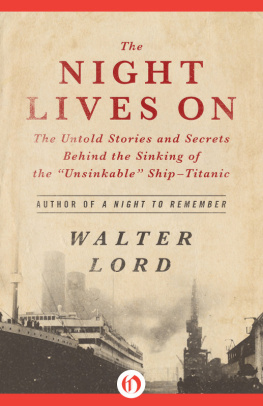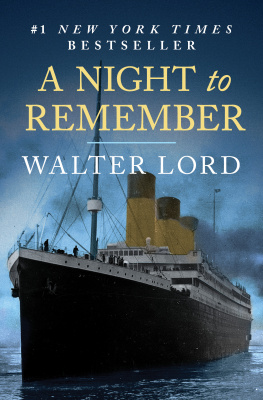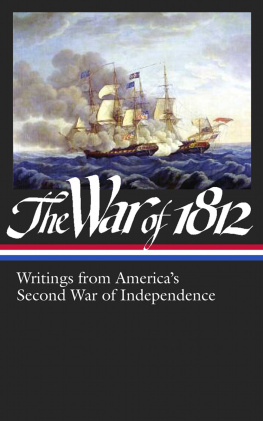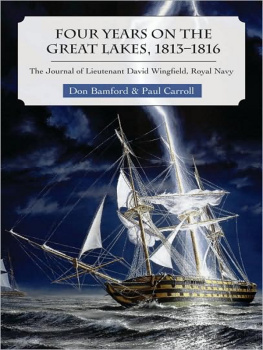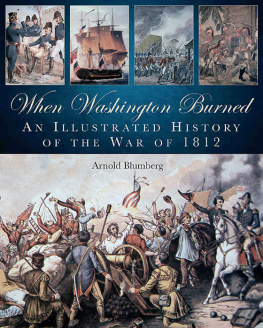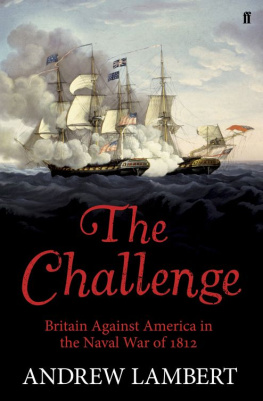
EARLY BIRD BOOKS
FRESH EBOOK DEALS, DELIVERED DAILY
BE THE FIRST TO KNOW ABOUT
FREE AND DISCOUNTED EBOOKS
NEW DEALS HATCH EVERY DAY!


EARLY BIRD BOOKS
FRESH EBOOK DEALS, DELIVERED DAILY
BE THE FIRST TO KNOW ABOUT
FREE AND DISCOUNTED EBOOKS
NEW DEALS HATCH EVERY DAY!


The Dawns Early Light
Walter Lord

To Marielle Mactier Hoffman
Foreword
TODAY, IT IS CALLED the War of 1812. Then, it was often called the Second War of Independence, and a glimpse of America during those trying times suggests the reasons why.
Caught in the cross-fire of the Napoleonic Wars, the young republic was scorned as a real nation by the European powers. Both the French and the English ignored Americas neutral rights, but Britains immense sea power made her the chief offender. For years she had impressed American sailors on the high seas; had issued a series of Orders in Council forbidding trade with Continental Europe; had not only blockaded the French coast but seized American vessels suspected of trading with the enemy, wherever found on the oceans.
For years America had proclaimed her rights in vain. Threats, lures, embargo, a Non-Intercourse Actall were tried in turn, and nothing worked. Meanwhile other sores were festering too. The agricultural south saw its crop prices drop in the wake of British trade restrictions. Western settlers feared British intrigue among the Indians. Land-hungry war hawks openly longed for Canada.
Finally President James Madison came to the end of the road. Perhaps it would have been different if he had known that London had for domestic reasons already decided to repeal the hated Orders in Council. But the step was taken and the news arrived too late. On June 18, 1812, the United States formally declared war on Great Britain.
Yet the very vote for war showed how nearly right Europe was in refusing to take the new country seriously. The results showed anything but a strong, united people. All the Federalists in Congress voted against the declaration. In the Senate the margin was only 19 to 13, with New England almost solidly opposed. To the banking and shipping circles of the east, the loss of an occasional ship or sailor was a small price to pay for the profits to be made.
Nor did the war itself weld the nation together. Let the southern Heroes fight their own battles, advised the Reverend Elijah Parish of Massachusetts. In New York and New England a lively smuggling trade developed, supplying the British armies in Canada. To stop this traffic, Madison tried an embargo on all shipping. It was soon abandoned; it only increased the dissent that tore at the country.
Economically, America seemed almost hopelessly weak. Committed to low taxes, the administration tried to finance the war by borrowing, but money proved hard to get. Foreign banks were leery; while New England, the wealthiest section of the country, declined to cooperate. Soon Washington was practically brokeCongress felt it couldnt even afford $6,000 to pay the salaries of two Assistant Secretaries of War.
Militarily too the picture was bleak. The Constitution beat the Guerrire, and American privateers raised havoc with British commerce, but the main front was Canada, and here there was little to cheer about. Perry won Lake Erie, but it was clear by the end of 1813 that the Canadian front was a bloody stalemate.
Nor did the east coast escape. British warships maintained an ever-tighter blockade, and during much of 1813 an enemy squadron roamed at will about the Chesapeake Bay. Raiding parties burned Frenchtown and Havre de Grace, pillaged Hampton, and prowled up the Potomac only 50 miles from Washington itself. The Presidents irrepressible wife Dolley dusted off the old Tunisian sabre, but she seemed the only one prepared. The militia fluttered helplessly about, and naval defense was virtually nonexistent.
Finally the British sailed away, but by the spring of 1814 a strong squadron was back in the Bay again, harassing the shores as it pleased. Then in May sensational news arrived from France: Napoleon had fallen. His defeat released thousands of Wellingtons tough veterans for service elsewherepresumably across the Atlantic. Reports set the figure as high as 25,000 men; the objective: unconditional submission.
And so the summer of 1814 found America threatened with national extinctionher people torn by dissension her treasury empty her economy in ruins her coasts blockaded and defenseless her army bogged down her navy bottled up her cities and farms now facing a new, apparently irresistible blow to be delivered at will by the richest, most powerful nation in the world. It would not be surprising if the whole American experiment collapsed under the impact.
Yet within eight months all had changed. America was again at peace, her people unified, her economy mending, her army and navy bursting with pride, her prospects limitless, her position safe in the family of nations. The turning point in this remarkable reversal of fortune is the story of this book.
CHAPTER ONE
Sails on the Chesapeake
THE GUESTS AT THE Pleasure House, a popular inn near Cape Henry, Virginia, could hardly believe their eyes. There in the first light of August 16, 1814, the horizon was dotted with sails, standing in from the rolling Atlantic.
By 8:30 they were entering the Chesapeake Bay, and Joseph Middletonthe U.S. Navys lookout stationed at the hotelcould make them out pretty well: three big ships of the line, a brig, a topsail schooner, several frigates, at least nine transportssome 22 vessels altogether. With a good glass he caught sight of the blue flag of a British admiral flying from the mizzenmast of the leading ship. Middleton jotted down the details, and by 9:45 an express rider was pounding hard for Norfolk. But the ships didnt head that way. They turned north, and with fair wind and tide swept on up the Chesapeake.
Around 1:00 P.M. they passed New Point Comfort 3:00, they were off Gwynns Island 6:00, Lieutenant Colonel John Shewning reported them abreast the Dividing Creeks near Wicomoco Church 7:00, Major Hiram Blackwell picked them up off Smith Point at the mouth of the Potomac. Here they met about a dozen other ships, already in the Bay, and as the two groups joined forces, the evening echoed with the thunder of saluting guns.
Dawn of the 17th, a meticulous lawyer from Washington, D.C., named Thomas Swann took up the watch. Swann was a volunteer military observer for the U.S. Army, stationed at Point Lookout on the northern side of the mouth of the Potomac. His job was especially to keep an eye on ship movements.
This morning he had his hands full. The ships were spread over two miles, and a heavy August haze made the viewing difficult. But he managed to count them up, and during the night the total had grown to 46 sails. Adding three more frigates off St. Georges Island and another two in the Patuxent River, that made 51 altogether.
Next page

